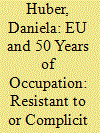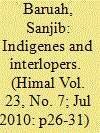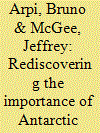|
|
|
Sort Order |
|
|
|
Items / Page
|
|
|
|
|
|
|
| Srl | Item |
| 1 |
ID:
169451


|
|
|
|
|
| Summary/Abstract |
This article focuses on the role the EU has played in the normalization of the 50-year long Israeli occupation of the Palestinian Territory. Has it resisted the occupation, challenging its normalization, or has it been complicit in it, thus contributing to it? To answer this question, the article proceeds in two steps. Firstly, it describes the ‘occupation’ through an inductive approach that reconstructs its structure through how it is experienced and described by key Israeli, Palestinian, and European human rights organizations active in the field, namely as a continuously expanding legal and territorial structure of domination. Secondly, it then juxtaposes the occupation so conceptualized with EU discursive and policy practices on the multilateral, bilateral, and unilateral levels. It reveals that, besides the widely noted discourse–practice gap related to the territorial structure of control, there is also a practice–discourse gap related to the legal structure of control, but which is silenced in EU discourse although partially addressed in its practice. The EU has been both complicit in and resistant to the occupation and therefore its role in the normalization of the occupation has been ambiguous.
|
|
|
|
|
|
|
|
|
|
|
|
|
|
|
|
| 2 |
ID:
105431


|
|
|
|
|
| Publication |
2011.
|
| Summary/Abstract |
The discourse on legal issues deriving from the second Intifada contains many controversial or undecided issues. For example, does Israel have a right to self-defense in Gaza or in the West Bank? What legal regimes should apply in Gaza and in the West Bank? In light of the above questions, the article discusses the differences and similarities of the legal status of these two territories and makes three claims. First, that Gaza and the West Bank should be considered separate legal units, and that different legal regimes should apply in each area. Second, the jus ad bellum, in particular the right to self-defense, can be applied to both the Israeli-Gaza conflict and the situation in the West Bank. Third, that despite the differences between the two legal units, neither of these geographical areas can be administered by a single legal regime.
|
|
|
|
|
|
|
|
|
|
|
|
|
|
|
|
| 3 |
ID:
096924


|
|
|
| 4 |
ID:
166569


|
|
|
|
|
| Summary/Abstract |
Despite the expectation of potentially vast petroleum resources in the offshore Arctic over the last decade, actual exploration and production rates are rather low. As of today, there are only two producing oil fields and one natural gas field in production. While technical challenges and a low oil price are among the explaining factors, the legal regimes for awarding licenses in Arctic waters may have a significant impact on industry interest as well. Offshore licensing regimes in Arctic countries range from State-centric in Russia to market-based in the United States. Further, some States developed additional requirements for companies wishing to operate in the Arctic waters. This paper examines the interconnections between the legal regimes for offshore licenses and the rates of industry activity in petroleum development in Arctic waters. It does so by devising an analytical comparative framework for the licensing regimes across five Arctic States. The results are then analysed in the context of actual exploration and production rates in Arctic waters. The analysis sheds light on the role of licensing regimes on the level of industry interest and corresponding exploration and production rates.
|
|
|
|
|
|
|
|
|
|
|
|
|
|
|
|
| 5 |
ID:
185843


|
|
|
|
|
| Summary/Abstract |
International law provides a system of legal order for the conduct of international relations. Within this system, states may constitute regional legal regimes in a continuous geographical area to address their own regional problems. In Antarctica, states active in the region have developed a sui generis regional legal regime (conceptualised here as ‘Antarctic Law’) to address problems of the Antarctic. During most of the twentieth century, Antarctic Law played a central role in understanding human interaction within, and international ordering of, the Antarctic region. However, over the last two decades, understanding the importance of the legal and regional nature of Antarctic law has become less prominent. Instead, Antarctic scholarship (including legal analysis) has moved towards a universalist perspective, interdisciplinary scholarship and critical approaches. We argue these approaches have under-appreciated the importance of the legal ordering of the region. New challenges within the region will require responses that draw on this regional legal ordering. This paper therefore aims to be a first step towards rediscovering the importance of the concept of ‘Antarctic Law’ as a regional and legal regime with a key role in providing successful international order within the Antarctic region to meet the challenges of the early twenty-first century.
|
|
|
|
|
|
|
|
|
|
|
|
|
|
|
|
|
|
|
|
|